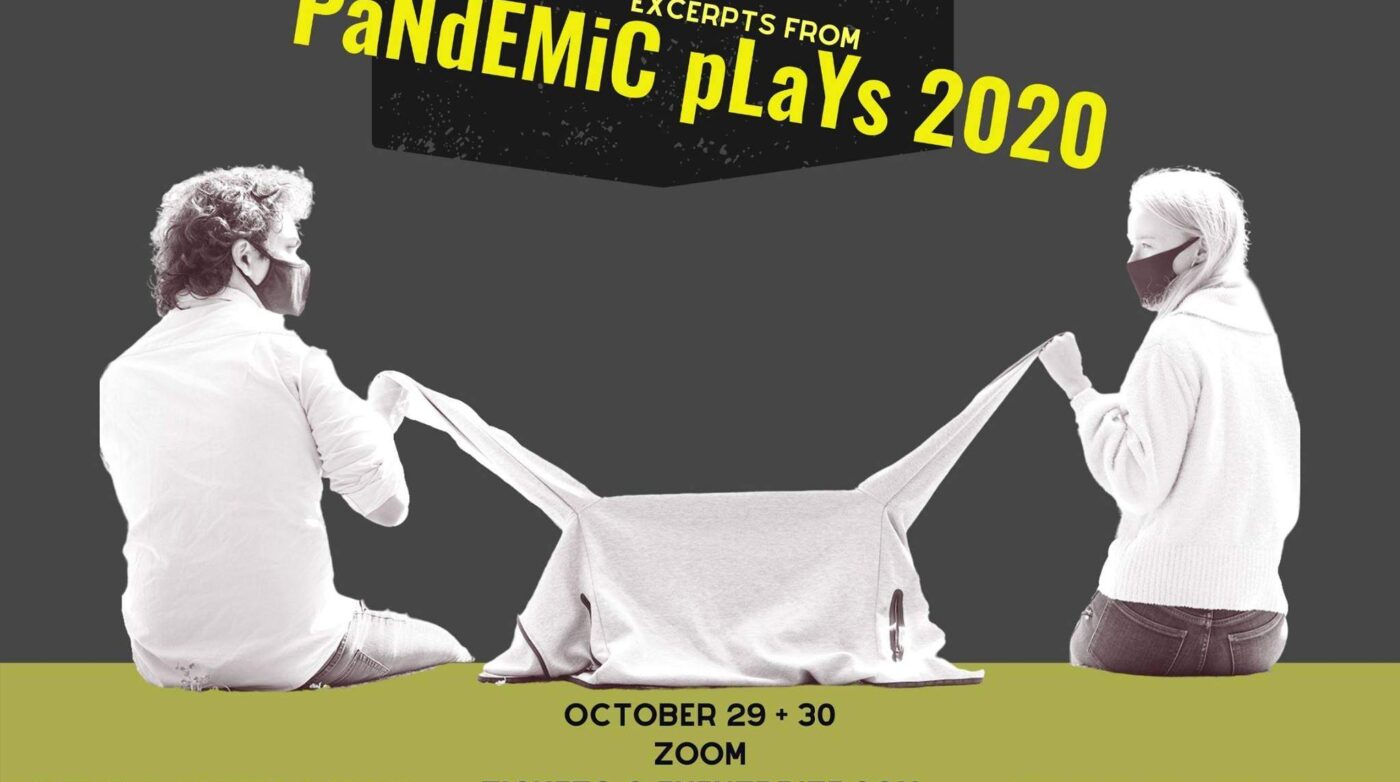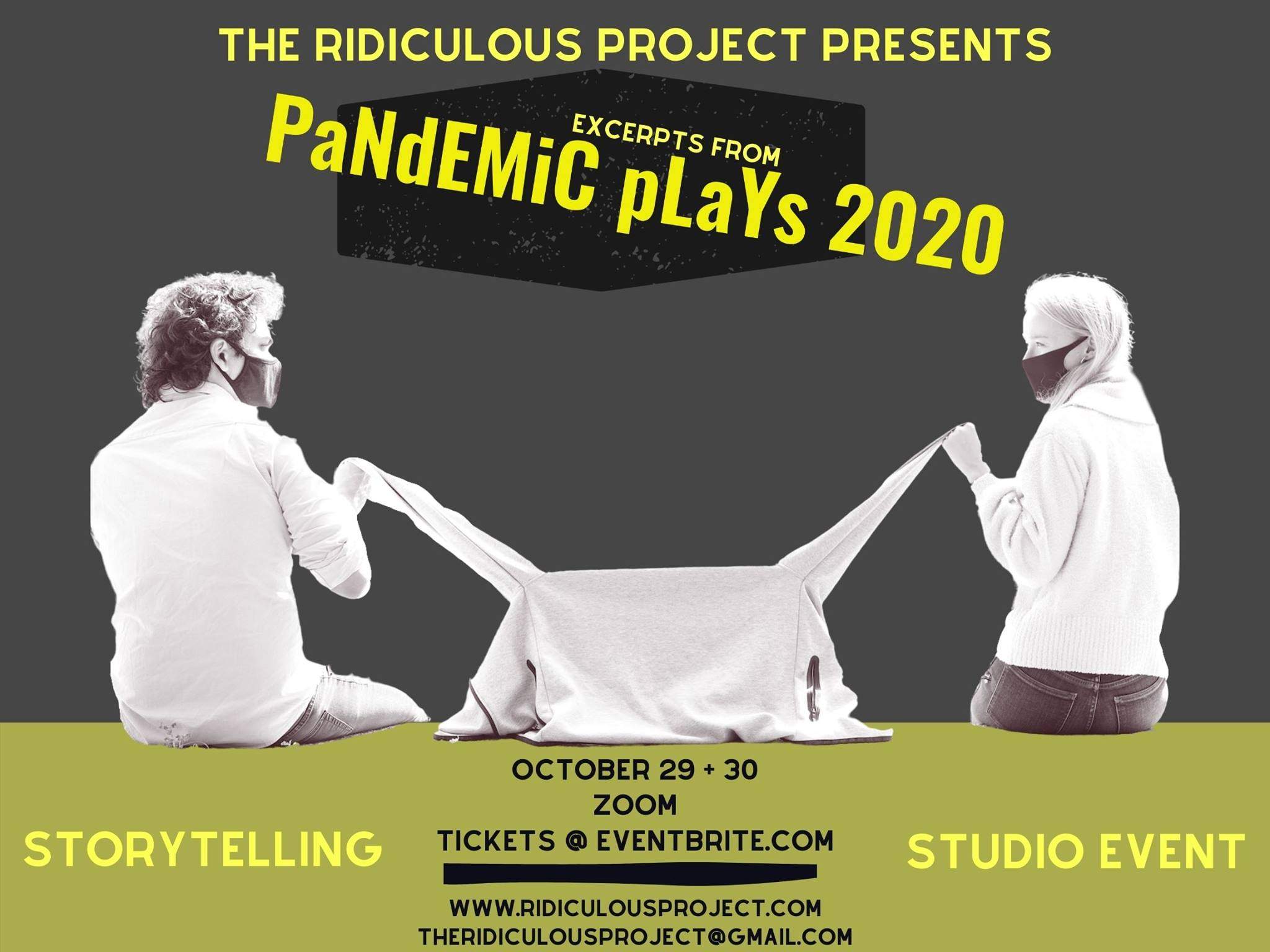
by Joey Phoenix
This past week, The Ridiculous Project held performances excerpting their newest work, Pandemic Plays 2020, an interactive storytelling studio written and produced by the project’s Founding Artistic Director Kate Kohler Amory. The studio was hosted via Zoom and contained a mix of pre-recorded content, live performance, and interactive storytelling.
2020 has been the advent of new digital theatre and interactive virtual experiences. It’s seen the invention of a whole new brand of entertainment and interaction formed out of the need for live theatre in a world where live theatre in its traditional form hasn’t been an option. Performers and theatre lovers alike have craved the entertainment and community that live theatre creates, and while there are no substitutes for the real thing, having digital experiences such as these is holding everyone over, for now.
For Pandemic Plays, the audience was led through a year in the life of a global pandemic by two clowns: Mike (they/them) and Jay (he/him) – who quickly highlighted the events of the last few months with physical comedy and their own first person accounts. Hearing the year condensed into familiar events and experiences – a carousel of small horrors – was effective but jarring.
For many, the past year has seemed outside of time. Wasn’t it just February last week? When was the last time we spent long leisure time outside? Held an old friend? Had an anxiety-free day? It’s often just enough to get through the days, so it seems natural to be fuzzy on the details.
Three pre-recorded scenes were interspersed between these live segments with our clown guides. At the beginning of the evening, Amory introduced these as excerpts from a larger production currently in the works. These three were chosen for their diversity, and each centered on a conversation between two people grappling with the pandemic in their own way.
These stories were a bit hard to watch, mainly because they scanned like archetypes of stories we’ve all heard before. “This pandemic has been uniquely isolating and deeply unifying,” Amory said, knowingly, during the show’s conclusion.
Any interaction no matter how small this year is tinged grey by this massive, uncomfortable, unifying story. And because of that, every story you hear, regardless of how different it is from our own experiences, has a brutal hint of familiarity.
From where I sat, Pandemic Plays seemed to be encouraging audience members to sit with their own experiences caused by this globally traumatic event while they all are still in it. But since these are mere excerpts in a larger production, one can only wonder if they are actually meant to be enjoyed after the pandemic is over, once we’ve managed to survive this mess.
An argument can also be made that there is a collective need to talk about what we’re experiencing while we’re experiencing it, because sharing stories in the darkest of emotional spaces might be the key that keeps the fire from going out inside of us completely. If there is no record of the challenges we faced, how can we grow once we’ve made it through to the other side?
But there is a balance to be struck.
One of the mistakes many people made at the start of this global crisis was in calling the Pandemic the great equalizer, which it isn’t. But what it has done is create space for empathy for people who you never would’ve come into contact with previously.
While this is mostly a positive movement, it has come with sharp edges. Compassion fatigue is a dangerous game and in a world where social media constantly bombards you with images and stories meant to elicit an emotional response, it’s very easy to become numb to all of it.
And so, for the main course of the evening, I found myself shifting in my seat uncomfortably. There was no question about the interlocking pieces being incredibly moving, but I found them at times too honest. We’ve been steeped in this crisis for months, and while a dose of regular escapism a la soma in Alduous Huxley’s Brave New World might not be the key to our healing, is being encouraged to accept the open-faced truth of what we’re experiencing in its rawest form the right kind of medicine?
My suspicion is that Amory knew this too, and provided a soothing element for all of us to vent our feelings and tell our stories in optional storytelling breakout rooms after the main performance. This opportunity to play was preceded by the prompt: “tell a story about how something small happened that restored your faith in humanity.”
I was popped into a breakout room of five other people, two of them facilitators – I was lucky enough to get the clowns Mike and Jay as facilitators. While Mike and Jay were getting instructions from the production team, the other three participants and I riffed on how to even answer the posed question.
“How can we condense the mostly negative feelings and sometimes bittersweet at best feelings of the last few months into a two minute anecdote?” We asked each other.
So instead of following the exact nature of the prompt, we decided instead to tell our stories of surviving in a world we found to be suddenly different, and where in all of that surviving we were able to find hope and a moment of grace for our world. Giving ourselves permission to answer the question in our own ways was the best thing we could’ve done for ourselves.
One person, a youth camp leader, told a story of how the kids in her camp who were only children were able to come and safely play with other kids for the first time since March. Another person told of how they worked in event management and that all of the gigs had dried up overnight, and they were learning how to embrace virtual events like these. Another person told of how they were supposed to be in Hawaii right now for a conference, but instead had the opportunity to watch their kid perform in the studio that night. Myself, I told of what it was like to have moved during COVID – and how I was finally safe in a home that I loved.
Before we went back to the main room, someone spoke and said “This is only a slice of all of our experiences, we have each been through so, so much more.” This was a statement that made me pause. What had hit so hard about Pandemic Plays 2020 wasn’t that the pieces were too honest or tried to call to attention things that I was tired of paying attention to, it was that this slice of life hinted at all of the things that people haven’t yet said, that they didn’t yet know how to say, and made me wonder how much longer this will go on before we understand any of it to tell our stories fully.
And in gathering these stories piece by piece I’m certain that with Pandemic Plays The Ridiculous Project is reaching for that depth. Every story heard opens a door to a story unheard, and every story told has the opportunity to bring us closer together, and every story heard is a chance that it won’t be lost in the constantly changing constantly shifting tides of a world during an election year in a global pandemic.
We are still in it, we are still hurting, and while when it’s all over we can’t forget what it was like to have been here…
Taking a break from it sometimes is important too.
Joey Phoenix (they/them) is the Managing Editor of Creative North Shore, the Digital Content Manager for North Shore Pride. You can follow them on twitter @jphoenixmedia, but what they really love is when you send them story ideas, book recommendations to joeyphoenix@creativecollectivema.com
Support Accessibility on the North Shore
Creative North Shore is having ongoing discussion of Accessibility and Disability Awareness leading up to the International Day of Disabled Persons on December 3 and the hopeful introduction of a Disability Parade in 2021. If this is a topic you are interested, have thoughtful story ideas, or know of an organization to add to the list below please reach out to joeyphoenix@creativecollectivema.com
Organizations to Support







